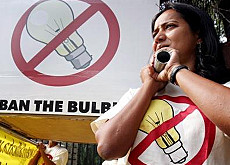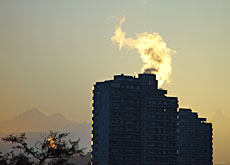Swiss to target big emitters in Bali

As the world's nations convene in Indonesia for a pivotal climate conference, Switzerland's priority is to put the focus on the big greenhouse gas emitters.
The head of the Swiss negotiating delegation in Bali, Thomas Kolly, told swissinfo that the emerging countries and the United States should be included in the system that applies from 2012.
“The countries that currently have binding targets within the Kyoto Protocol account for around one-quarter of CO2 emissions and that is just not enough,” he said.
China is poised to overtake the US as the world’s leading carbon emitter. But Beijing says it won’t be ready to take on emission caps “for a large period of time”. India is also arguing for catch-up time to lift its people out of poverty.
But Kolly believes there are promising signs for US participation in the negotiating process, partly because of public opinion and partly because of the strength of scientific evidence.
Roadmap
The key word at the two-week conference will be “roadmap”, with the deadline of 2009 looming for the conclusion of a future climate deal to replace Kyoto, which expires in 2012.
“In Bali the goal and the probable outcome will be that we will decide on a roadmap that will lead us to the end of 2009 and the climate conference that takes place then,” Kolly explained.
“It may look very modest and bureaucratic but you have to construct a road to allow cars to move. Putting together a roadmap also includes outlining the substantive issues,” he added.
Political momentum has been building on the climate change issue this year in the run up to Bali.
Last month the Swiss government announced that it would align itself to the new European Union targets, which foresee emissions reductions of 20 to 30 per cent by the year 2020.
IPCC report
November also saw the publication of the fourth and most damning report from the Intergovernmental Panel on Climate Change (IPCC).
The UN scientific panel declared that climate systems have already begun to change.
The IPCC said in the summary that the evidence was in the measured warming of air and ocean temperatures, widespread melting of snow and ice, and rising sea levels.
The report by the IPCC – co-winner of this year’s Nobel Peace Prize along with United States politician and climate crusader, Al Gore – is expected to guide negotiators in Bali.
It lays out various scenarios of future impacts, depending on how quickly and decisively action is taken to reduce greenhouse gas emissions.
Despite the sense of urgency imparted by the IPCC and UN Secretary-General Ban Ki-moon, who has said the world is “on the verge of a catastrophe”, the wheels of international politics are likely to continue moving at a measured pace.
swissinfo with agencies
The 175-nation accord, a 1997 annex to the 1992 UN climate treaty, requires 36 industrial nations to reduce greenhouse gas emissions by an average of five per cent below 1990 levels by 2010.
The US and Australia were the only major industrial nations to reject Kyoto, and as a result US greenhouse emissions will grow by 33 per cent between 1990 and 2010 and Australia’s by 11 per cent.
The Swiss parliament ratified the Kyoto Protocol on climate change in 2003. Switzerland undertook to reduce its CO2 emissions to 10% less than 1990 levels by 2010.
However, some experts are doubtful that this target will be met. In 1990 greenhouse gas emissions stood at 53.3 million tonnes; in 2000 they were 52.7.
A CO2 law came into force in 2000 to ensure that the Kyoto target was achieved. About a thousand enterprises have taken voluntary measures measures to reduce their emissions.
But it became clear by 2005 that these measures were not sufficient. It is proving difficult, however, to agree on how to strengthen them.

In compliance with the JTI standards
More: SWI swissinfo.ch certified by the Journalism Trust Initiative











You can find an overview of ongoing debates with our journalists here . Please join us!
If you want to start a conversation about a topic raised in this article or want to report factual errors, email us at english@swissinfo.ch.